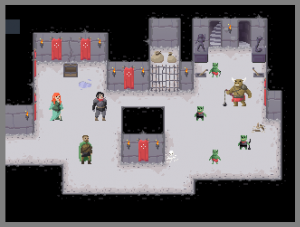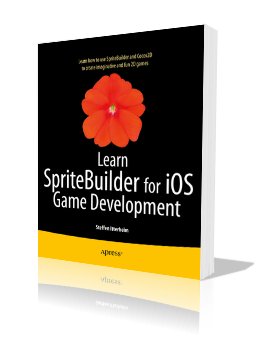
|
KoboldTouch brings you the best 2D game development experience for Apple’s platforms!
KoboldTouch is the only Objective-C, ARC-enabled 2D game engine built on the Model-View-Controller (MVC) design pattern. Write ambitious games with greater ease!
KoboldTouch is also a continuously evolving, customer driven game development framework for iOS & Mac OS X, designed by game industry veterans to incorporate game development best practices and decades of experience.
Learn more about KoboldTouch features and what’s in it for you:
Open the “About KoboldTouch” Page for Details
Not quite ready for KoboldTouch yet?
Fill out the KoboldTouch Survey. Let us know what you think of KT and how to make it better.
Get KoboldTouch!
KoboldTouch is available as a subscription program that entitles you to updates and support.
Choose Your Support & Updates Plan
Recurring billing may be cancelled at any time. The yearly plan is non-recurring.
Monthly
$14.95
You will be charged $14.95 every month.Quarterly
$39.95
You will be charged $39.95 every 3 months.One Year
$119.95
You will be charged $119.95 once. No automatic rebills.
60-Day Money Back Guarantee
If you’re not satisfied you can request a refund within 60-days from the date of purchase, directly via Clickbank.
As a cocos2d user you’ve probably encountered this before: you just added another sprite, a label, a particle effect or some other node to your scene - but it just won’t show up!
This article is an attempt at documenting the possible causes, providing steps you can take to verify and hopefully rectify the situation. You can use this as a checklist to provide help for this exact situation. Bookmark this page because you will have to use it eventually, I guarantee you.
What do you do if your app doesn’t behave as it should, or even crashes?
Answer A: Post your problem in just about every programming forum.
Answer B: Use the Xcode Debugger to analyze what’s going wrong.
Since most of you already know how to do A I’ll focus on B in this Xcode 4 Debugging Crash-Course. It’s kind of aimed at beginning Xcode developers but that’s just because I hope - against better knowledge - that experienced developers already know that … thing … that debugger stuff. Ya know?
I need help. I’ve run into strange problems with a very simple cocos2d v0.99.4 project created from the cocos2d project template. It’s two scenes with a layer each, much like the regular HelloWorldScene layer. Each scene is simply supposed to replace itself with the other scene, on touch. What happens is that the first scene started with runWithScene is never deallocated after the first scene change. So it stays in memory and keeps receiving the touches, which means a touch is always behaving as if switching from the first to the second scene.
What’s more, if I add the onEnter and onEnterTransitionDidFinish methods to the first scene, without adding any code to them, the first scene/layer doesn’t receive any touch events at all. The second scene doesn’t show this behavior and works fine with these methods implemented.
Maybe I’m just overlooking the very obvious, if you could take a look and let me know if there’s anything I’m doing wrong with this code please let me know! Thank you.
Download the code here: ScenesAndLayers02












Bad user reviews and comments can actually be a good thing
Bad reviews, or simply trash talking and bad-mouthing, can have a positive effect on your game, and yourself. Don’t be overly concerned if some idiots voice their BS and drag down your review score. If you value what you do and others see that value, the positive effect of some bad rep is simply that it encourages others to voice their opinion in favor of the product and you. The things you should not do, however, is to be overly protective and try to remove such posts. That will only serve to earn you disrespect from everyone because freedom of speech is a much higher value. If disrespected, it will earn you much more disrespect in return. If you’re in doubt whether what’s been said is offensive, keep it online until someone complains. The more absurd and unreasonable negative comments are the more happier should be, and you’ll quickly notice other users jumping in to make their case. You, on the other hand, should stay out of it. React to the positive comments, ignore the bad-mouthing and trash-talking that is only targeted to lure you out in the open.
Applied to the App Store, where you have no control over the bad reviews other than complaining about them in your blog: don’t do it. No one cares about your whining on bad reviews. They happen. If your game is really good, it will get good reviews. The bad ones will only serve to encourage others to post their opinion and they often provide good reasons not to listen to “those jerks”. The other bad reviews which are clearly not from idiots you should hold dearly. They contain valuable criticism about your product. It will help you improve. Nothing is more powerful than a dissatisfied customer or someone who was simply disappointed which you were able to turn to your side by listening and reacting to their criticism. People love to criticize, but even more so they love when someone is actually listening and making changes in their favor.
Caveat: some people will always criticize no matter what. And some will always know how to make things even better. Those are the kind of people who could sway you into feature-creep, don’t listen to them, they’ll kill your product the more you try to make it theirs. And some will be jerks for live and just randomly change their opinions on a daily basis, probably based on what they heard or read today, or whether they were drinking or not, or whether today’s weather is good or bad. Listen only to the feedback that is voiced most often, which others agree on and which is consistent.